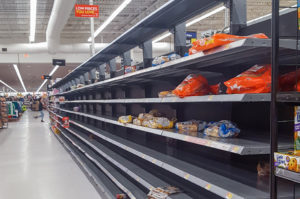 Three weeks into the coronavirus impact in the US, many grocery stores are sill having trouble keeping necessities in stock. Visiting five different grocery stores yesterday, there was only scarce amounts of eggs, butter, meat, paper towels, and of course, toiler paper. It would seem with the sophisticated supply chain in this country, that this shouldn’t be a problem.
Three weeks into the coronavirus impact in the US, many grocery stores are sill having trouble keeping necessities in stock. Visiting five different grocery stores yesterday, there was only scarce amounts of eggs, butter, meat, paper towels, and of course, toiler paper. It would seem with the sophisticated supply chain in this country, that this shouldn’t be a problem.
In basic economics, when the demand for a good rises, the price rises as well. The coronavirus has increased demand for many products, with some of this demand being authentic and some being panic-buying. Yet retail prices on these items have barely budged.
Stores seem hesitant to raise prices due to the policies and perceptions regarding “price-gouging”. The NC Attorney General has promised to hold firms accountable for charging “excessive prices” during this state emergency. Senator Tom Tillis has introduced federal legislation to further punish businesses that engage in price-gouging.
These policies fail to consider how market systems work. As stated earlier, when demand for a good increases, the price typically rises. This higher price creates new incentives: 1) It encourages suppliers to produce more of the good since it is now more profitable to do so, and 2) it encourages consumers to use the good more conservatively.
When a good’s price is prevented from rising, what follows is an inevitable result: shortages. Suppliers see no reason to greatly increase the short-term supply, and buyers see no reason not to stock up. The market system essentially gets short-circuited.
Many stores are limiting the purchase of essential items to one or two units. So far this hasn’t worked, as many of these items remain out of stock. The more effective way to reduce demand is simple: raise the price.
Higher prices will reduce panic buying. It will cause consumers to use goods more efficiently and to buy only what they truly need. Higher prices will make consumers think twice about stockpiling excessive amounts.
An argument against letting the price increase is that this may impact consumers in need, especially lower-income citizens. This is a legitimate concern. It’s best to think of a price increase as the lesser of two evils.
For a low-income consumer, what’s the better option: having the choice to buy a good for a higher price, or having no choice to buy anything since it’s out of stock? Consumers without a lot of income aren’t going to have the resources to chase these goods across different grocery stores either, especially if they are using public transportation.
Higher prices are a tool to guide both consumers and producers through a hopefully short-term disruption in the market. Long-term, markets tend to work well at producing what consumers want. In the meantime, if you’re tired of seeing empty shelves at the grocery store, let stores raise their prices.


